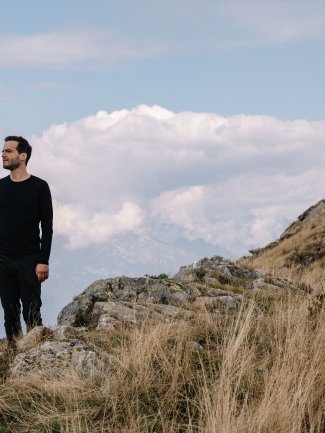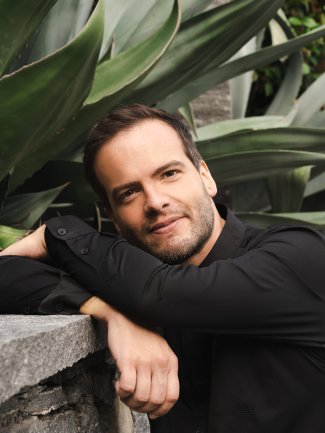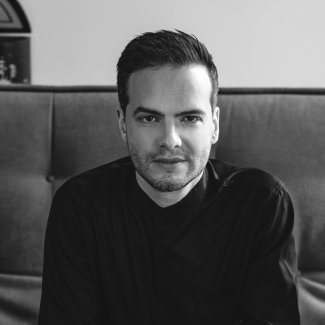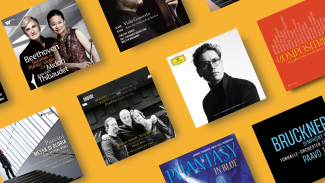



Francesco Piemontesi
“It was playful, assertive, intelligent music-making, with bone-china clarity from Piemontesi”
The Times
Artistic Director: Settimane Musicali di Ascona
Artist in Residence: Orchestre de la Suisse Romande 2020/21
Swiss-Italian pianist Francesco Piemontesi, a native of Locarno, has over the years gained a reputation as one of the leading interpreters of the German classical and romantic repertoire. He appears as a regular guest with many of the world’s leading orchestras, in concert halls and music festivals around the globe, while still being firmly anchored on the shores of Lago Maggiore as Artistic Director of the music festival Settimane Musicali di Ascona.
With his subtle but mesmerizing interpretations of Schubert’s piano sonatas as well as the solo works and piano concertos of Mozart, Beethoven, Brahms and Liszt, he has been acclaimed internationally by critics and audiences alike. His playing is characterized by sensitivity, intimacy and poetry, but also by power and brilliance. Above all, it is important to him to illuminate the scores from within: “Making music is like a second language for me. It feels like an existential necessity. I don’t want to entertain the audience, I want to let them participate in the deep dimensions of music.”
Highlights of the 2024/25 season include appearances at the BBC Proms, an extensive tour with the Orchestra dell’Accademia Nazionale di Santa Cecilia, performing Mozart’s concerto for two pianos KV 365 with Jan Lisiecki under the direction of Gianandrea Noseda. The tour features a special appearance by the orchestra in Locarno, where Piemontesi continues to hold the position Artistic Director of the Settimane Musicali di Ascona. Further ahead, Piemontesi appears with the Filarmonica della Scala, also conducted by Noseda, L’Orchestra Sinfonica Nazionale della Rai, Gewandhausorchester under Manfred Honeck, and returns to the Frankfurt Radio Symphony and SWR Symphonieorchester. Further engagements include returns to the NDR Elbphilharmonie Orchester, NHK, Chicago and Pittsburgh Symphony Orchestra, The Cleveland Orchestra, San Francisco Symphony, Budapest Festival Orchestra and London Philharmonic Orchestra with Robin Ticciati, as well as the Helsinki Philharmonic. In recital, Piemontesi appears at Auditorium Lyon, Rudolfinum/Dvořák Hall, Tonhalle Zurich, and La Chaux-de-Fonds, to mention just a few.
See more
In addition to the classical and romantic periods, Francesco Piemontesi’s wider repertoire includes works by Bach and Handel in original versions and transcriptions, piano concertos by Ravel, Debussy, Bartók, Rachmaninov and Schönberg, as well as works by Olivier Messiaen and Unsuk Chin. Among his many important musical influences, he highlights his distinguished teachers Arie Vardi and Alfred Brendel, but above all French concert pianist Cecile Ousset. It is to her that he owes his rounded tone and a somnambulistic technique that is rooted in the French piano tradition going back to Marcel Ciampi.
Francesco Piemontesi’s musical artistry is documented on numerous recordings that have received awards and critical acclaim, such as Schubert’s last Piano Sonatas, Debussy’s Preludes and Mozart’s Piano Concertos with the Scottish Chamber Orchestra conducted by Andrew Manze. His latest release on Pentatone is dedicated to two of the most demanding pieces of piano literature: Liszt’s Transcendental Etudes and the B minor Sonata.
Working with fellow musicians and orchestras alike, Francesco Piemontesi’s collaborations form themselves from the nucleus of friendship, appreciation and creativity. He recently has been Artist in Residence with the Orchestre de la Suisse Romande, Dresden Philharmonic and Gstaad Menuhin Festival. A long-standing relationship links him to the Schubertiade Festival and London’s Wigmore Hall. As adept on the concert stage as he is in smaller chamber combinations, Francesco Piemontesi appears with a variety of partners including Renaud Capuçon, Leonidas Kavakos, Martha Argerich, Janine Jansen, Daniel Müller-Schott, Augustin Hadelich and Jörg Widmann.
As a soloist, he has played alongside leading orchestras such as Berlin, New York and Los Angeles Philharmonic, Orchestre de Paris, Symphonieorchester des Bayerischen Rundfunks Munich, the Chicago, Boston and London Symphony orchestras, as well as the Tonhalle-Orchester Zürich, Swedish, Danish National and Finnish Radio Symphony Orchestras. He regularly collaborates with distinguished conductors such as Fabio Luisi, Antonio Pappano, Daniele Gatti, Lorenzo Viotti, Robin Ticciati, Iván Fischer, Mirga Gražinytė-Tyla, Marek Janowski, Joana Mallwitz, Thomas Søndergård, Daniel Harding, Paavo Järvi, Zubin Mehta and Nathalie Stutzmann.
Francesco Piemontesi travels the world and has appeared in many prestigious venues including Concertgebouw Amsterdam, Carnegie Hall and Avery Fisher Hall New York and Elbphilharmonie Hamburg. As a welcomed guest he was featured in the festivals of Salzburg, Edinburgh, Aix-en-Provence, Lucerne, Verbier and Schleswig-Holstein as well as in La Roque d’Anthéron, New York Mostly Mozart and Klavierfestival Ruhr.
HarrisonParrott represents Francesco Piemontesi for worldwide general management.
Contacts
Sabine Frank Senior Director, Co-Head of Artist Management | Managing Director HP Munich | Head of International Offices
“Piemontesi’s unfussy, rarely flamboyant style is a good fit, opening the floodgates to
a range of expression and intensity that instantly reels you in.”
“Piemontesi devotes to Schubert’s late A major Sonata D 959 dedication and
perseverance and he is one of the few who can immediately perform with the correct
tone required for Schubert (Pentatone). Most impressive indeed is his approach to
Schubert’s last death-desiring B‑flat major Sonata, which one rarely hears so
unpretentiously and so comprehensively and thoughtfully.”
“[Piemontesi] performs these three outstanding works with fleet fingers and
exceptional insight. His deep affinity for the music is evident in the way he captures
the ebb and flow of each movement; the pearlescent tone he delivers when
appropriate; and the abundance of telling details…”
“It turned out that on both days the audience’s appreciation and acclamation was
primarily directed towards the man at the piano: Francesco Piemontesi showed
exactly the level of subtlety the Larghetto deserves, but also a lot of joyful energy. The
acclaimed pianist also delighted with two encores […]”
“Piemontesi’s reentry balanced lyricism with panache, and he sailed through the
movement’s octaves, trills, rapid runs and other technical hurdles with thorough
command and conviction, pointing towards a coda grand and victorious.”
“[Piemontesi] played with grace, delicacy, and wonderful awareness of his musical
partners … The sheer variety of pianistic touch was a joy to behold. Legato and
pianissimo weren’t just smooth and soft here. In Piemontesi’s hands, they were silken
and preciously quiet.”
“He devoted the first half to Bach, a tremendous, majestic unfolding chiefly of Busoni
arrangements of organ works…Here was a new immensity of approach, and it
resulted in a mesmerising, prodigious account of Rachmaninov’s Sonata No 2 … and,
though it may, with its irresistible blend of swashbuckling power and searching
reflectiveness, have felt like the ultimate piano sonata before, it certainly did so in
Piemontesi’s triumphant rendering.”
“Observing him [Piemontesi] play evoked the same feeling of awe I experience when
watching principal ballet dancers in action. It was evident that Piemontesi pays
exacting attention to form and technique, the effort exerted by each muscle, and each
passage’s relationship to its surrounding musical landscape … it sounded absolutely
effortless. Even in the sparkiest moments, Piemontesi landed on the notes with a light
bounce.”
“… his Mozart Piano Concerto No. 19 was simply spellbinding: fresh and direct in a
supple opening movement; exquisitely blended and balanced in its singing slow
movement.”
“Piemontesi’s playing was flawless, meeting all technical difficulties: he made it look
effortless, with a feeling of spontaneity which prevailed throughout”
“Mr. Piemontesi drew out the reflective undercurrents even while playing with grace
and élan… I hope he returns to New York soon.”
“Francesco Piemontesi gave a definitive performance in Mozart’s Piano Concerto No
27 in B flat major… He brought generous warmth and spaciousness to the opening
movement, and lovely poise to the slow Larghetto; his sound was gloriously
transparent throughout.”
“There’s a quiet sense of command that is evident from the off… Throughout there’s a
tremendously clear sense of narrative, capturing both the grandeur and the myriad
hues of Liszt’s remarkable tone poem.”
“Unflustered technique and bold dynamics make for a persuasive account”
“Piemontesi is unfazed by the technical demands and delights in the pictorial aspects
of Liszt’s wanderings through his homeland. The lilting sixths of Pastorale recall the
composer’s love of Italian bel canto, while Piemontesi “sings” the melodies of the
Vallée d’Obermann with beguiling sensibility and revels in the sunny tintinnabulation of
Les Cloches de Genève.”
“Piemontesi’s account offers huge dynamic range… he never breaks the sound. The
Piano is perfectly prepard and recorded.”
“Francesco Piemontesi was the immaculate soloist in a similarly brisk but beautifully
detailed performance of the C‑minor Concerto, its intimacy underlined by the piano
facing inwards, lid-off, the orchestra embracing his sound.”
“Francesco Piemontesi was the crystalline soloist, suavely taking his lead from the
deliciously moulded introduction… With an unfussy pianist like Piemontesi matching
Norrington’s inventiveness this was a sparkling account.”
“[Piemontesi] has become a Mozartian to cherish. It’s hard to fault his sense of line,
structure and deft approach to detail in these two concertos from Mozart’s Vienna
period… Piemontesi’s polished playing is alert with exactly the kind of spontaneity
essential to great Mozart performance.”
“Another factor that lifted this concert well beyond the ordinary was the presence of
young Italian pianist Francesco Piemontesi. He gave a wonderfully winning
performance of Mozart’s final piano concerto, faithful to the work’s dewdrop lucidity
and gentle nostalgia, but irradiated with joie de vivre too, in the way he garlanded
Mozart’s notes with stylish and witty flourishes of his own. The orchestra and
Gražinytė-Tyla were alert to his every move.”



















